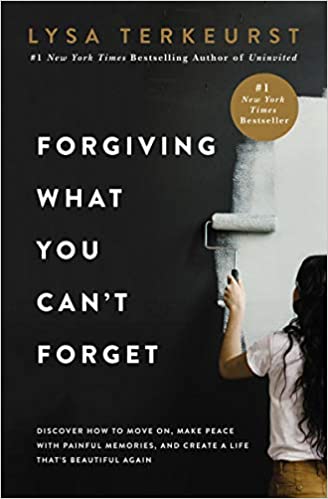Forgiving What You Can't Forget — Book Summary
Introduction
Do you find you find yourself defining life by the past events of your life?
Is it possible to forgive, heal and move on after some series of hurt have been done to you?
The book is about finding out what to do when confronted with the fact that you cannot forget what happened and hence cannot forgive it. It opens your eyes to the concept of forgiveness, how to obtain it from God, how to forgive with the memories still fresh, and how to live happily with the impact of hurt done to you.
It doesn't negate the fact that some pains can never go away totally, rather, it directs you on how to acknowledge the pain and go through the process of healing for both current hurt and the ones that would come in the future as a result of aftermath and triggers of this same hurt.
Interesting quotes from the book
My ability to heal cannot be conditional on them wanting my forgiveness but only on my willingness to give it.
— Lysa TerKeurst, Forgiving What You Can't Forget
I have held many things in my hands, and I have lost them all; but whatever I have placed in God’s hands, that I still possess.
— Lysa TerKeurst, Forgiving What You Can't Forget
Hope is the melody of the future. Faith is dancing to that melody right now.
— Lysa TerKeurst, Forgiving What You Can't Forget
Summary of the book Forgiving What You Can't Forget
Chapter one begins with acknowledging that when forgiveness is perceived as a double-edged sword, you are bound to be resistant to it, and you give excuses referred to as the soldiers of unforgiveness. They are cynicism, bitterness, and resentment, delay, and trust issues. One thing about the soldiers of unforgiveness is that they work against you, not against the person who hurt you.
Chapter two begins with how we feel when forgiveness is mentioned. When we are hurt and the word forgiveness is mentioned, it resonates to us as guardedness, defeat, anger, hurt, fearfulness, etc. These things help us put up some excuses why we cannot forgive. During that period, we'd decide to come up with a coping mechanism for our hurt. We create alternate realities to escape the hurt. However, forgiveness and healing can only happen when we acknowledge our hurt and walk the path of healing.
Chapter three begins with how we may consider our situation unsurvivable, making it difficult to forgive. When we don't forgive and work towards healing, we transfer the pain to persons who know nothing of our hurt. To come out of this darkness, consider taking the power they have to hurt us, even when they are far away from you. That is the only way you can move forward. Also, you'd need to own the pain to control it better, not vice versa.
Chapter four begins with the excuses we give to avoid forgiveness. It further explains to us that to forgive doesn't require the offender to acknowledge or even apologize to you. Also, most times when they do, it doesn't wipe away what has been done or restore things to normalcy. That is why you have to learn to separate your healing from their choice. For forgiveness, deciding to forgive happens at a particular time, but the process of forgiveness happens.
Chapter five begins with collecting the dot. These dots are our past stories. Visiting our past is relevant because stories from our past impact what we believe about other people, ourselves, our belief about God and what we believe about forgiveness.
Chapter six begins with connecting the dots from our past. When things happen to us that is a story we bear. However, we also create the stories we prefer. This chapter further explains that to connect these dots, you have allowed yourself to be vulnerable. Being vulnerable is like doing away with the shame of the stories. It equates being shameless to Adam and Eve's nakedness in the Garden of Eden before the eating of the forbidden fruit. While connecting the dots, look out for things, persons, seasons and days you avoid or try to stay away from. Find out why you avoid them.
Chapter seven begins with correcting the dots. Those things you connected entails the things that made you go behind to avoid certain things and people need to be corrected. Correcting them entails coming to terms with them and rewriting the terrible stories attached to them. Rewriting the story entails changing your view of them and seeing how different they are from what you were to see them as.
Chapter eight begins with why the unforgettable feel unchangeable. We imagine what our lives would have been if the incident didn't happen. That leads us to conclude that it is unforgettable and unfair. This chapter helps us come to terms with the issue by acknowledging that forgiveness is better than revenge, because it will give you peace. We realize that the offender is in pain. Acknowledging this will swap your anger with compassion for them, leading you to view them as human, not a devil.
Chapter nine begins with the importance of setting boundaries to avoid dancing with dysfunction. When faced with issues we cannot control, we are forced to want to jump in and save the situation, especially if the person involved is a loved one. Setting boundaries is not shitting them out, rather it is shielding yourself from the effect of their hurt to protect your sanity. It will also prevent you from enabling them.
Chapter ten behind with an image of what the mind is like when we are hurt. We begin to pray for God to intervene in the situation by punishing the offender, indicating us, or at least restoring our last glory. However, when God doesn't do any of that, we consider him not as powerful as we have said he is. We begin to feel like he wronged us.
Chapter eleven begins with forgiving God. After we may have been pissed with God. When our healing is taking its cause, we may begin to realize that God never offended us, rather he takes charge in his time and in his way.
Chapter twelve begins by showing us the part loss plays in our life. According to this chapter, sitting in loss and grief can be a good cure for bitterness. This is because bitterness found its way into us through loss, hence if we retrace our step, we can get it out through that same way. Bitterness is caused by unprocessed emotion. Hence the feeling of loss can help us to become vulnerable allowing us to process the emotions.
Chapter thirteen begins with bitterness functions. It skews our perspective and takes away peace from our lives. However, when we embrace humility, we will be open to embracing peace.
Chapter fourteen begins with how we can live the practice of forgiveness daily, even if we have not accepted to let go of the past. What matters in forgiveness is progress, not perfection.
Key Lessons from the book
Lesson 1: Endeavour to take power from the person that hurt you.
When you are hurt, the next thing that comes to your mind may be to take revenge. This would lead you to become bitter, resent persons that care for you and eventually you may end up in an unending sorrow.
However, taking power from them requires you to remind yourself that they hurt you, but do not have the right to determine which memory to ruin and how you should behave. There are sweet memories that may have come before that incident, hold on to them and avoid replaying the memory of the hurt. It would prevent you from moving on with your life.
Lesson 2: Set boundaries to avoid dancing with dysfunctions.
When we are watching our loved one's actions that'd damage them, we try to advise them, but they throw away our advice. There is always this instant urge to jump in and save them. In trying to save them, we wear ourselves and resources out. We cannot save them when we work harder than those that need saving. We may end up worse than them.
Hence, we have to set boundaries. Setting boundaries is not shutting people off, but shielding yourself from the consequences of their actions. It also stops you from trying to change them even when they have refused to change. Setting boundaries reminds you that you can't control what is out of your control. These boundaries help us to not enable them. Enabling them entails keeping their secret, defending them, lying for them, working hard on their issues, blaming others for their behavior, etc. Drawing boundaries also helps you to protect your sanity and spiritual capacity.
Lesson 3: God answers prayers at the right time with the required response
One of the things that break us most when we are hurt by people is that we hope and pray that God dishes out judgment on them or even perform some miracle to save us from the situation. When none of these happens, we begin to question Him. Most times we get to the point of doubting His power and existence. Some other times we begin to see it as Him offending us.
However, we need to understand that He answers prayers at the appropriate time with the answer that you need not the one you want. We need to always trust Him and his infinite mercy to attend to our needs, not our wants.
Review of the book Forgiving What You Can't Forget
I found this book really touching. The idea that such an important concept is in my hands can be a bit overwhelming, but having Lysa take me through forgiveness, gentle bit by bit was a relief. I would have loved to see God's role a lot more in this however, as I believe forgiveness can't be attained fully in human strength.
Conclusion
I wouldn't say this book is for every single person reading this review, but I would say it wouldn't hurt to give it a chance. While the book isn't exhaustive, it is a good start, if you're trying to learn forgiveness.
Don't miss the other book summaries on SunInMe.org

